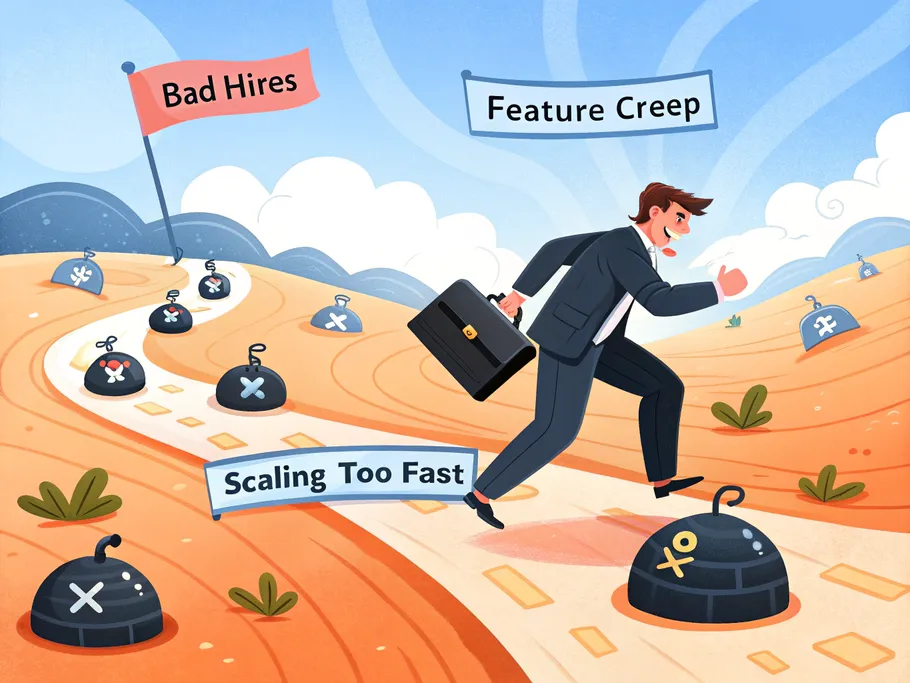Meet Sarah. She bakes the best pastries in town, and her bakery is buzzing.
Sarah’s living proof that sometimes success feels like being chased by your own ambition.
The real question: can she grow her business without sacrificing the magic
(or burning out in a floury meltdown)?

This is the tightrope walk of business scaling – growing big, but not breaking.
Scaling your business:
Congratulations, you’re successful enough to start hating your life on a larger scale.
Both growth and scaling mean “more,” but only one is clever about it.
Picture this: double your sales but keep your costs almost flat. That’s business scaling, not just growth.
Startups usually move through these phases:
Investors are obsessed with scaling vs growth. They want businesses that print money using proven, repeatable systems – not hopeful experiments.
Modern tools – automation, tech, SaaS, and e-commerce platforms – let you scale like a magician pulling rabbits (and profits) out of hats. Think cloud infrastructure or automated order fulfillment: more customers, not more headaches.
When you increase production, your average costs drop. How?
Benefits: Lower costs per item, juicy discounts, and expert teams.
Use the same resources to offer more products.
Example: Sell to new markets using the same ads, or car companies sharing engines across models.
Find the sweet spot between central control and letting local teams do their thing.
Mixing both lets you mass-produce standardized stuff (scale) and use it across tons of products (scope). That’s how you win at business scaling.
Scale right, or join the 70% of startups that face-plant by scaling too fast with unproven models. Premature scaling is the business equivalent of trying to run a marathon before you learn to walk – impressive in theory, disastrous in practice.

Strategic, deliberate scaling – built on real product-market fit and financial sanity – is the antidote to brand implosions and drained bank accounts.
Before you pour gas on the fire, make sure you have a fire worth fueling. That’s the “Zero Moment of Truth“: validate your core business idea. If your value proposition is wobbly, scaling just means bigger bills and a faster fall.
A winning, scalable idea draws a crowd and lets you add customers (and cash) way faster than expenses.
Entrepreneurs love to ask, “How do I get more revenue?” but skip the part where they check if anyone actually wants what they’re selling. Rookie mistake. Focus on real, recognized value – or prepare to scale your losses.
Ask yourself:
If you can’t answer these, stop. Refine. Repeat.
If your value isn’t clear, scaling is just multiplying confusion.
Know your audience’s pain points and dreams. If you scale products nobody wants, you just get more rejection letters – faster. Stay in touch with your market, keep feedback loops open, and adjust as you grow.
Want to scale cheap and fast? Help your customers win. When they grow, so do you.
Create features that make customers’ lives easier. This builds loyalty, reduces churn, and turns your users into your marketing team. That’s the secret sauce of business scaling strategies.
If you can answer “yes” to all, you’re golden. If not, you’re just scaling vanity metrics.
Obsessed with scaling numbers? Congrats, you’re just building a bigger, faster trainwreck.
Here’s the “how” of scaling:
People, process, tech, and market – if one fails, the whole thing wobbles.
Focus on repeatable processes, not just quick wins. Turn successful results into standard operating procedures (SOPs), automate where possible, and train your team to clone success.

Scaling is a minefield. Here’s where most step on a bomb:
Pro tip: Use predictive analytics, monitor customer sentiment, and roll out changes in phases. Test before you leap.
You need both. The first keeps you alive. The second makes you unstoppable.
Invest in scalability: Reinvest profits, chase smart funding, and back high-return bets. Startups that validate before scaling are three times more likely to land early funding. Investors have trust issues – prove you’re scalable.
Spend smarter, not just more:
AI and automation can:
Example: AI simulations cut bad idea rates by 73% during validation. That’s not luck, that’s leverage.
Stay ahead by constantly experimenting and adapting. Innovation keeps you relevant.
Scaling can make you forget why you started. Regularly check if you’re still solving real customer problems. Solicit feedback, adjust, and keep your product-market fit sharp.
Scaling isn’t a straight line. Be flexible, learn fast, and don’t be afraid to pivot. That’s how you dodge disaster and snag new opportunities.
Scaling turns bright ideas into game-changers – if you do it right. Distinguish scaling vs growth, validate what matters, champion your customers, refine your processes, and invest with brains (and a dash of guts).
Stay agile, avoid the pitfalls, and keep your eyes on the vision. That’s how you build something that lasts.
It’s a unique challenge when success itself creates stress, leaving you feeling stretched thin trying to keep up. Navigating growth means finding ways to keep what’s important while building something bigger.

Email subscription is available ONLY TODAY (oh, okay, and tomorrow).
Surely, we respect your inbox! Unsubscription works every day.

We’d love to tailor your experience — which of these best describes you?